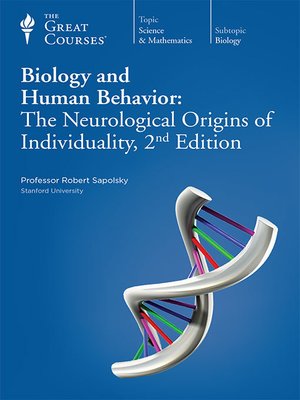Biology and Human Behavior
audiobook (Unabridged) ∣ The Neurological Origins of Individuality, 2nd Edition
By Robert Sapolsky

Sign up to save your library
With an OverDrive account, you can save your favorite libraries for at-a-glance information about availability. Find out more about OverDrive accounts.
Find this title in Libby, the library reading app by OverDrive.



Search for a digital library with this title
Title found at these libraries:
| Library Name | Distance |
|---|---|
| Loading... |
When are we responsible for our own actions, and when are we in the grip of biological forces beyond our control? What determines who we fall in love with? The intensity of our spiritual lives? The degree of our aggressive impulses? These questions fall into the scientific province of behavioral biology, the field that explores interactions between the brain, mind, body, and environment that have a surprising influence on how we behave. In short, how our brains make us the individuals we are. In this series of 24 fascinating lectures by a prominent neurobiologist, zoologist, and MacArthur Foundation "genius" grant recipient, you'll investigate how the human brain is sculpted by evolution, constrained or freed by genes, shaped by early experience, modulated by hormones, and otherwise influenced to produce a wide range of behaviors, some of them abnormal. And you'll learn how little can be explained by thinking about any of these factors alone, because some combination of influences is almost always at work. Professor Sapolsky includes a provocative exploration of the implications of our emerging understanding of the origins of individual differences, considering such questions as: How much do these insights threaten our own sense of self and individuality? Where do we draw the line between the essence of the person and the biological abnormalities? What counts as being ill? Who is biologically impaired, and who is just different? As more and more subtle abnormalities of neurobiology are understood, how much should we worry about the temptation to label people as "abnormal"? And what happens when we each have a few of these labels?







